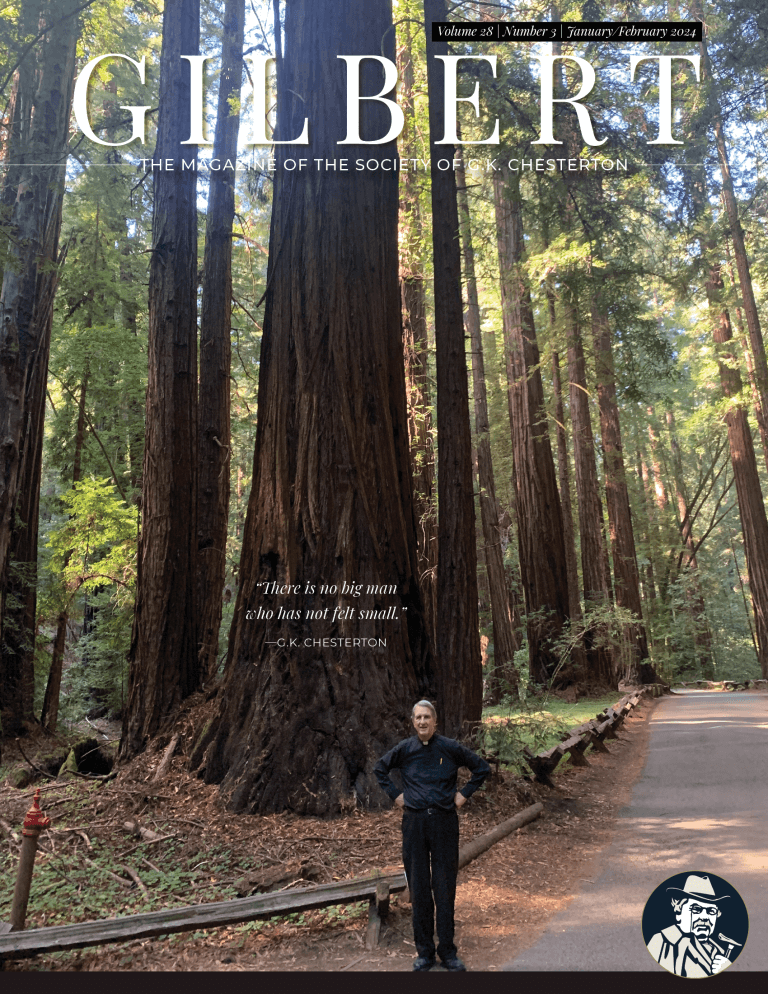(Warning: Spoilers for “The Eye of Apollo” follow.)
In the first nine stories in The Innocence of Father Brown, the priest discussed reason, redemption, pride, humility, and the presence of evil. In “The Eye of Apollo,” Father Brown sermonizes on a form of neopaganism and the arrogance of mind cure theories.
As the narrative opens, Father Brown and Flambeau observe the public worshipping habits of Kalon, a self-proclaimed devotee of the sun god who is attracting attention with his public prayers. As they watch, Flambeau describes what he knows of the priest of Apollo:
“As I understand it, it is a theory of theirs,” answered Flambeau, “that a man can endure anything if his mind is quite steady. Their two great symbols are the sun and the open eye; for they say that if a man were really healthy he could stare at the sun.”
“If a man were really healthy,” said Father Brown, “he would not bother to stare at it.”
“Well, that’s all I can tell you about the new religion,” went on Flambeau carelessly. “It claims, of course, that it can cure all physical diseases.”
“Can it cure the one spiritual disease?” asked Father Brown, with a serious curiosity.
“And what is the one spiritual disease?” asked Flambeau, smiling.
“Oh, thinking one is quite well,” said his friend.
The spiritual disease Father Brown speaks of can be given many names: arrogance, self-delusion, and perhaps most kindly, misplaced optimism. It can be a frightening prospect to be sick. Knowing one faces pain, disability, and even death can lead someone to be desperate for a cure. However, for many people, it is more than the loss of health that disturbs them, it is the loss of power. Ailments from migraines to tumors can leave the sufferer feeling completely helpless. Most patients are at the mercy of their doctors’ abilities. People who hate to cede control in anything connected to their own lives and fates may latch onto ideologies that convince them that they can cure themselves, and that is the snake oil Kalon is selling.
Pauline Stacey is the target of Kalon’s manipulations, and he seeks to profit from her refusal to admit her own weakening physical condition arising from her deteriorating eyesight. Her worsening disability is an affront to her self-image as a strong and independent woman. Tragically, modern medicine held the potential to fix, or at least slow down, the progress of her condition, but Pauline had been brainwashed into believing that the only cure worth using came from the force of her own indomitable will. She trusted in the force of her own character, and it ultimately left her powerless.
When discussing Pauline’s belief that she didn’t need help to fix her worsening blindness, Father Brown explains,
“Her sister would have started eyeglasses if Pauline would have let her; but it was her special philosophy or fad that one must not encourage such diseases by yielding to them. She would not admit the cloud; or she tried to dispel it by will. So her eyes got worse and worse with straining; but the worst strain was to come. It came with this precious prophet, or whatever he calls himself, who taught her to stare at the hot sun with the naked eye. It was called accepting Apollo. Oh, if these new pagans would only be old pagans, they would be a little wiser! The old pagans knew that mere naked Nature-worship must have a cruel side. They knew that the eye of Apollo can blast and blind.”
Pauline believed in the false prophet Kalon, and instead of providing the promised cure, his guidance weakened her further. After Pauline’s mysterious death, in a grand-sounding monologue, Kalon expounds upon his own greatness and the base inadequacy of Christianity. Yet upon close reading, unlike Father Brown’s homilies, which are full of wise insights and perceptive observations, Kalon’s words are strikingly shallow. His speech basically boils down to “I’m awesome, you’re awful,” as he expounds on the strength and purity of his faith without providing any details as to why it’s so much better than Father Brown’s Catholicism. It’s a sermon of style over substance, and even Father Brown is briefly stunned by it, but not for very long.
It was the first time Flambeau had ever seen Father Brown vanquished. He still sat looking at the ground, with a painful and corrugated brow, as if in shame. It was impossible to avoid the feeling which the prophet’s winged words had fanned, that here was a sullen, professional suspecter of men overwhelmed by a prouder and purer spirit of natural liberty and health.
In just a few minutes of investigation, Father Brown and Flambeau learn that not only is Kalon’s imposing manner simply skillful play-acting, but also that he is not nearly so unworldly and clever as he proclaims. Rather than promoting “natural liberty and health,” Kalon’s teachings are designed to enslave a woman he wishes to exploit, and his methods only serve to make an ailing woman sicker. In the last words of the story, Father Brown explains how Kalon’s failure to realize that he needed to act like a genuine human being exposed him as a fraud and a killer, and the spell Kalon tried so desperately to cast is broken, shattered by Father Brown’s faith, logic, and observation. Father Brown often debates with those who disagree with him, but he always gets the last word.






